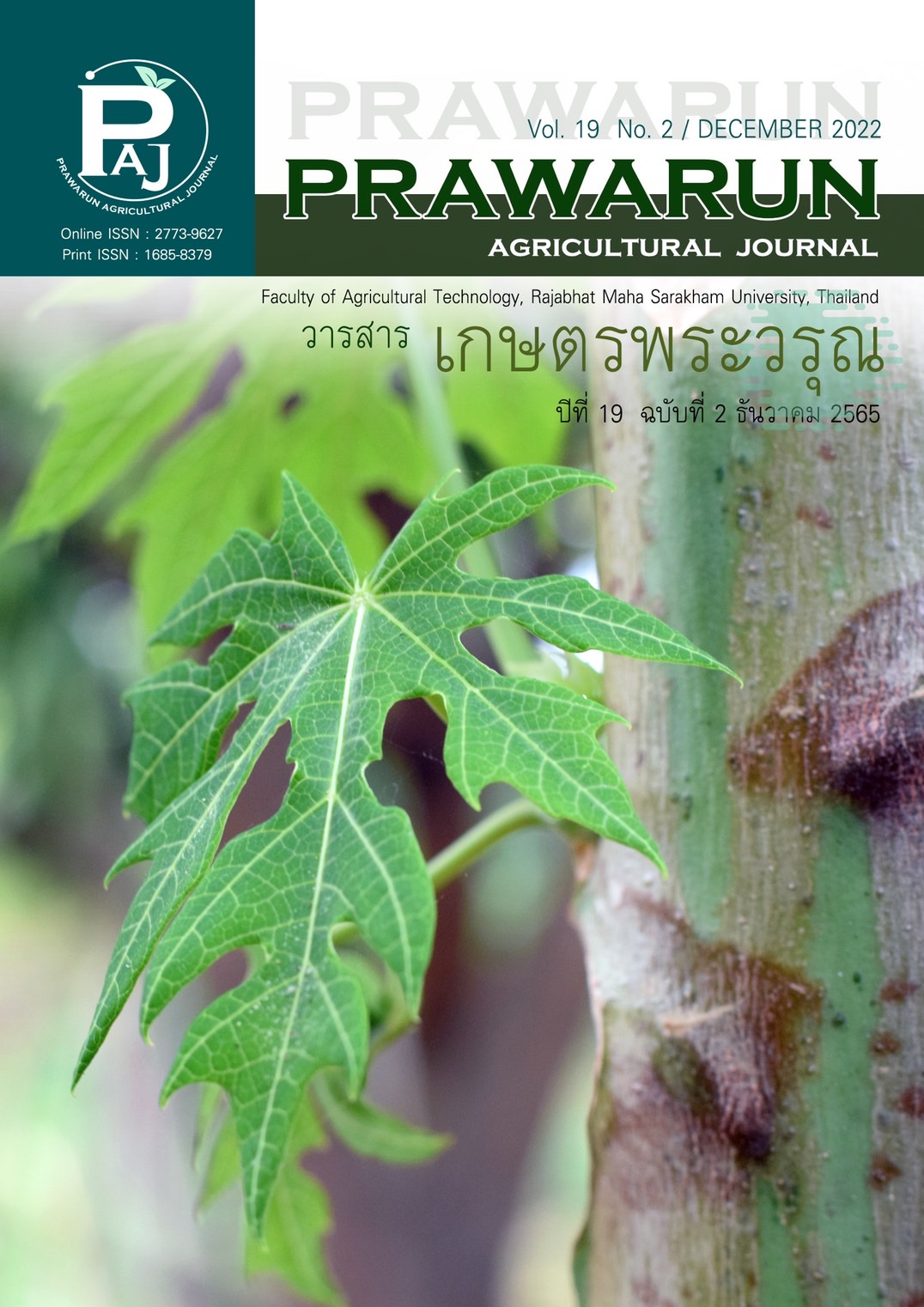ต้นแบบ Smart farming สมุนไพร สู่การขับเคลื่อนเมืองสมุนไพรอย่างยั่งยืนพื้นที่ จังหวัดมหาสารคาม
Main Article Content
บทคัดย่อ
วัตถุประสงค์ของงานวิจัยนี้เพื่อพัฒนาต้นแบบการผลิตสมุนไพรในระบบ Smart farming และผลิตภัณฑ์แบบครบวงจรในระดับจังหวัดตั้งแต่ต้นทาง กลางทาง ปลายทาง โดยมีความร่วมมือหลายภาคส่วน ทั้งภาครัฐ ชุมชนและเอกชนอย่างเป็นรูปธรรม และเพื่อถ่ายทอดนวัตกรรมการเกษตรอัจฉริยะ เพื่อเพิ่มประสิทธิภาพการผลิตสมุนไพรในพื้นที่จังหวัดมหาสารคาม ระยะเวลาดำเนินงาน 12 เดือน ตั้งแต่เดือน มิถุนายน พ.ศ. 2563 ถึงเดือน พฤษภาคม พ.ศ. 2564 ในพื้นที่จังหวัดมหาสารคาม วิธีการดำเนินงาน ประกอบด้วย 6 ขั้นตอน คือ 1) การคัดเลือก Smart Farmer ต้นแบบ สมุนไพร 2) การถอดบทเรียนจาก Smart Farmer ต้นแบบสมุนไพร 3) จัด Zoning และถ่ายทอดองค์ความรู้ด้านสมุนไพร 4)ถ่ายทอดนวัตกรรมการเกษตรอัจฉริยะด้วยเทคโนโลยีอินเทอร์เน็ต 5) ถ่ายทอดองค์ความรู้ด้านผลิตภัณฑ์สมุนไพรตามระบบ Smart Famer ให้กับกลุ่มวิสาหกิจสมุนไพร 6) พัฒนาช่องทางการตลาดตามระบบ Smart Farmer ผลการดำเนินงาน พบว่า สามารถคัดเลือก Smart Farmer ต้นแบบสมุนไพร ได้จำนวน 554 ราย แบ่งเป็น 6 กลุ่ม 5 อำเภอมีพื้นที่ปลูกสมุนไพรจำนวน 444 ไร่ ผลิตสมุนไพรหลายชนิด เช่น ขมิ้นชัน ไพล มะระขี้นก ว่านชักมดลูก ตลาดที่สำคัญ ได้แก่ โรงพยาบาลสมเด็จเจ้าพระยาอภัยภูเบศร และตลาดประชารัฐ ทำการถอดบทเรียนจาก Smart Farmer ต้นแบบสมุนไพร คัดเลือกได้ จำนวน 6 กลุ่ม เน้นข้อมูลของความโดดเด่น (ด้านการบริหารจัดการสวนสมุนไพรให้ประสบความสำเร็จ รายได้ ผลผลิต) และการปฏิบัติในระบบเกษตรที่ดีและเหมาะสม (GAP) ระบบเกษตรอินทรีย์และปัจจัยสำคัญที่ทำให้ Smart Farmer ต้นแบบประสบความสำเร็จ และถ่ายทอดองค์ความรู้ด้านสมุนไพร ตามอายุการเก็บเกี่ยว ได้เป็น 3 กลุ่ม สร้างนวัตกรรมระบบ Smart farming สมุนไพร ให้กับชุมชน จำนวน 3 ชุมชน นำองค์ความรู้ด้านผลิตภัณฑ์สมุนไพรตามระบบ Smart Famer ให้กับกลุ่มวิสาหกิจสมุนไพรในจังหวัด โดยการอบรมเชิงปฏิบัติการ จำนวน 22 ครั้ง และพัฒนาช่องทางการตลาด ในลักษณะการทำ Contract farming กับหน่วยงานภาครัฐ อาทิ บริษัทประยงค์บ้านไร่สมุนไพร และตลาดประชารัฐจังหวัดมหาสารคาม สามารถส่งเสริมการผลิตและแปรรูปผลิตภัณฑ์สมุนไพรให้มีคุณภาพตามระบบ Smart framing และได้มาตรฐาน GAP และอินทรีย์ สามารถสร้างรายได้ให้กับกลุ่มเกษตรผู้ผลิต วิสาหกิจชุมชน จากการสำรวจความพึงพอใจและการนำองค์ความรู้ไปใช้ประโยชน์ พบว่า ด้านเนื้อหา มีค่ามากที่สุด รองลงมาเป็นด้านวิทยากร และด้านที่มีค่าต่ำสุด คือ ด้านความเข้าใจ
Article Details
เอกสารอ้างอิง
Chawapradit, P. (2015). The situation of production and marketing of medicinal plants, herbal plant promotion group and Species.Bangkok: Bureau of agricultural commodity promotion and management, Department of Agricultural Extension.
Choksawatthanakit, S., Janthasri, R., Pharanad, S., & Kaewtasri, S. (2019). The Nadoon project, a prototype of a herbal model in good and suitable agricultural systems to drive the herbal city of Maha Sarakham province (Research Report). Bangkok: National Research Council of Thailand (NRCT). (in Thai)
Department of Agriculture. (2018). Herb cultivation. Bangkok: Agricultural cooperative community press of Thailand. (in Thai)
Department of International Trade Promotion. (2014). Thai herbs to ASEAN economy: change and development. Bangkok: Service business office and trade logistics. Ministry of Commerce. (in Thai)
Janthasri, R. (2015). A Study of networking of local agencies case study: Kosum Phisai district, Maha Sarakham province under the Royal Plant genetic conservation project Her Royal Highness Princess (Research Report). Maha Sarakham: Rajabhat Maha Sarakham University. (in Thai)
Joshi, K., Panara, K., Nishteswar, K., & Chaudhar, S. (2013). Cultivation and pharmacological profiles of root of Piper longum Linn. Pharma Science Monitor an International Journal of Pharmaceutical Sciences, 4(1), 3617-3627.
Mancharoen, S. (2003). Process of Thai herbal business management and local occupation promotion, Mueang district, Lampang Province. Chiang Mai: Chiang Mai University press. (in Thai)
Ministry of Agriculture and Cooperatives. (2018). Project to promote the planting of herbs and basic processing. Bangkok: Department of agricultural extension, Ministry of agriculture and cooperatives press. (in Thai)
National Science and Technology Development Agency. (1973). Project to study the market opportunity of targeted Thai herbs. Bangkok: National Science and Technology Development Agency. (in Thai)
Petchang, R., Kamonkunanon, S., Tongsiri, S., & Boonsung, A. (2016). Herb business management for boosting the local occupation in Uttaradit Province. Area Based Development Research Journal, 8(1), 62-77. (in Thai)
Smart Farmer and Smart Officer Policy Driving Committee, Ministry of Agriculture and Cooperatives. (2013). Guidelines for driving policies smart farmer and smart officer. Bangkok: Ministry of agriculture and Cooperatives. (in Thai)
Sukbot, S. (2006). Entitled market segmentation and target market choices of Thai herbal products: a case study of northern region Songkhla (Research Report). Songkhla: Department of Business Administration, Faculty of Management Science, Prince of Songkhla University. (in Thai)
Wachirapanyapong, S. (2018). Approach to enhance Thai massage business in Ang Thong Province. International. Journal of Economic Policy in Emerging Economies, 11(4), 295-305.


